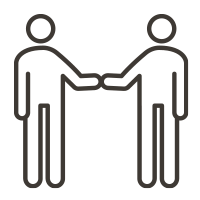Peer Self-Advocacy (PSA)

Peer Self-Advocacy (PSA)
Disability Rights California Peer Self Advocacy (PSA) program provides outreach and self-advocacy training to people with mental health disabilities who live in mental health residential care facilities, state hospitals and the community.
Peer Self-Advocacy (PSA)
“Be confident enough to Voice your needs, be brave enough to Learn from others and be strong enough to Live the life you imagine.”
- Maria Garcia, PSA Program Coordinator
Disability Rights California's Peer Self Advocacy (PSA) program presents self-advocacy trainings to people with mental health disabilities. We provide our services to people who live in mental health residential care facilities, state hospitals and the community.
All PSA staff have lived experience as people with mental health disabilities. As peers, we are just like the people we serve. This helps build a special bond with our peers - something traditional mental health providers often cannot provide.
We help our peers learn their legal rights and develop self-advocacy skills. These tools help them identify their goals, create action plans and get services and resources they need. Through our peer connection, we provide hope, encouragement and empowerment.
PSA Program Services
We mainly serve people with severe mental health disabilities who live in California mental health residential facilities. Some are ready to leave the facility. Others want to make their daily lives better. We provide our self-advocacy services onsite as well as provide webinars.
How Do PSA Services Help?
Unlike support groups or therapy groups, our self-advocacy groups provide a space for peers to share experiences and support one another. The PSA groups teach members their disability rights and allow them to share their peer perspective. Peers use this information to advocate for their own needs and goals. Some of our topics include:
- Self-Advocacy Skills
- Accessing Services and Resources
- Other rights-related topic
… and many more. We develop our own training materials. We customize our trainings and topics upon request.
We also provide trainings to facility staff, family members, service providers and others who work with peers.
How to Contact Us
For information about our self-advocacy groups and trainings, you may contact us at:
Peer Self-Advocacy Unit
1-916-504-5800
1-800-719-5798 (TTY)
PSA@disabilityrightsca.org
Registration Form for The PEER Connection
Sign up for our open forum for peers and people with lived experience with mental health disabilities* to communicate with other peers via a group listserv throughout the state.
Helpful Links
- National Mental Health Consumers' Self-Help Clearinghouse
- National Empowerment Center
- Mental Health America
 Success Story
Success Story
The Power of Asking
PSA self-advocacy group members at a room and board facility for people with mental health disabilities were upset because the facility manager asked them to sign documents that were not in a language they understood. They wanted to know the purpose of the documents and an explanation for why the manager needed their signature. The group met to strategize for their meeting with the Room and Board manager about this issue.
PSA staff explained their right to receive information in their own language. Reviewing DRC's PSA materials on “Tips for Effective Advocacy,” group members prepared by asking questions, sharing information and supporting their peers, making copies and putting the document in their personal files. Now that they knew their rights and practiced their self-advocacy skills, they requested the manager provide the documents in Spanish. Group members reviewed them together. Once they understood the information, they made an informed decision to sign the documents. After completing this, they felt empowered, by successfully advocating for their rights. They realized to “ask and you shall receive” wasn’t so difficult after all!




